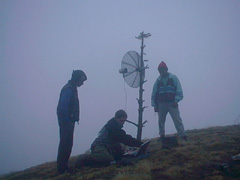The spectrum and the stimulus


HITECH, you will recall, is the health IT portion of the Obama stimulus, with as much as $19 billion in subsidies for those who buy certified Electronic Health Record (EHR) systems over the next five years.
(To the right, a WiFi aerial being installed in Nepal.)
In Part I they note there is, as yet, no standard definition of what an EHR must contain. It's subject to change and thus, they suggest, only the power to create such a record should be specified.
In Part II they go deeper, describing the various layers of technology -- physical, device, application, connection -- and what should be done by regulators in terms of history.
Breaking AT&T's monopoly on phone devices and Apple's hold on iPhone applications were critical to the growth of the Internet and the iPhone App store, they argue. Standards can bind as well as loose. Standards should describe what works and not specify how to make it work.
This brings them to the heart of the matter, the CCHIT certification process that threatens to bind the industry to vendor-specific technology, creating not just monopoly rents but bottlenecks to advancement. What is at issue?
It is the potential linkage of incentive payments to a certification process that would require specific applications to manage health data.
In thinking about these insights I could not stop myself from thinking of wireless data, a beat I have covered for a decade now.
Most of our frequency spectrum is "owned," most of it by a very few companies. This not only gives them monopoly rents but control over wireless devices. Phones must be "certified" to run on the Verizon, AT&T, Sprint or T-Mobile networks. The carriers are in control. Thus you can only buy an iPhone from AT&T.
Some slices of the spectrum are outside this control, the so-called "unlicensed" frequencies used most notably by the WiFi router on your desk. Here control lies not in ownership of the spectrum but in approval of the equipment. WiFi gear has strict power limits to reduce interference on the spectrum, which can be used and re-used from house to house to house.
The result of all this is that most of our spectrum is very underused, while WiFi spectrum is heavily used. When buying a new Netbook recently I found that all my neighbors now have WiFi routers installed, all of them secured with at least a password.
There is far more data moving on my street using WiFi than there is on all other frequencies combined, and this is probably true where you live. By endorsing an open standards-making process, and regulating only the power output of devices, government let the bit market flourish.
Consider your average general hospital. How many now have extensive WiFi networks installed? How much data are they running using licensed cellular frequencies? From which do they gain the most benefit?
Of course critics may then ask, what about the market? After all, each of the major cellular carriers brings in far more revenue, per hertz of spectrum, than the folks making WiFi routers. It's the vendors who benefit from the closed system, users who benefit from the open one.
This is at the heart of our present dilemma. Vendors know they can't compete with open source, the equivalent in this case of the WiFi standard. Thus they will naturally seek to define as much as they can, maybe define open source out entirely, and thereby protect their cash flow.
The public interest lies with WiFi, the private interest with cellular monopolies, but guess which side has the money to control what happens in Washington? Seen much new unlicensed spectrum lately? Last time I checked folks were still fighting for slivers of white space while the rest of the old TV spectrum has already been sold to monopolists.
So there is a clear difference between the "market interest" here and the "public interest." If the "market interest" controls what systems HITECH subsidizes the "public interest" will be left fighting for crumbs.